Disclaimer: I wrote this article to educate the public on data collection and surveillance pursuant to Supreme Court precedent and the Foreign Intelligence Surveillance Act. I am not condoning the actions of the government, nor am I stating that the government should not engage in intelligence surveillance. This article gets somewhat technical. I’ve tried to express as many things as I can in layman’s terms, but I’ve also tried to track the language of the laws and the Supreme Court to avoid injecting bias or opinion.
Further, this article does not represent the views of Phandroid.com or Neverstill Media, LLC. Lastly, other than the “How I Feel About It” and “Devil’s Advocate” (as written by Chris Michaels) sections, this article does not represent my views or opinions as a citizen, attorney or writer, but those of the Supreme Court of the United States and the laws of this country.
There’s been a lot of talk about government surveillance by the NSA, pursuant to the Patriot Act, and whether it’s legal. The ACLU is filing suit against the government concerning the FISA Court warrant allowing the FBI to obtain all user data from Verizon customers, and it is surely one of soon-to-be many lawsuits to come from this leak. Because there is a lot of confusion about what’s actually legal, what the government can and can’t do and what is or is not a “search” under the 4th Amendment, I wanted to provide some information in order to educate people.
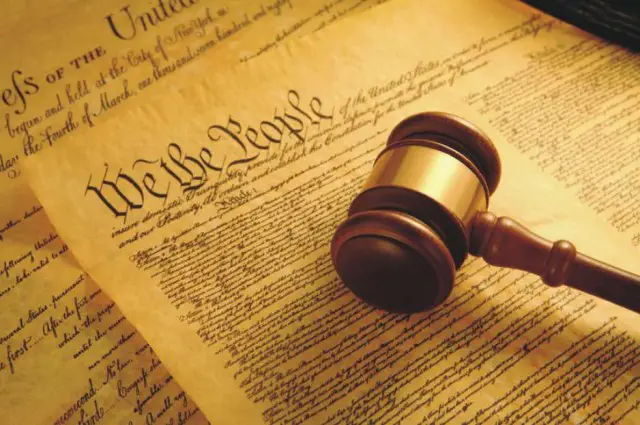
Understanding the 4th Amendment
First, let’s cover some 4th Amendment basics. How does a court judge know when the 4th Amendment has been violated? The legal standard is: whether the person had a reasonable expectation of privacy. See Katz v. United States, 389 U.S. 347 (1967). Seems simple right? It’s anything but simple as you’ll see below.
But first, let’s get something straight, “reasonable expectation of privacy” is an objective standard. “How can this be objective,” you ask? Because the “reasonable” part is what society deems reasonable (or more aptly, what the courts have said is reasonable based on a hypothetical reasonable person). The “reasonability” in question is not your reasonable expectation of privacy, but that of what society says should be reasonable.
We’re going to start with pen register data. Pursuant to Smith v. Maryland, 442 U.S. 735 (1979), the government does not need to obtain a warrant to gather pen register data, as this data is not a “search” within the 4th Amendment. A pen register is:
a device or process which records or decodes routing, addressing, or signaling information transmitted by an instrument or facility from which a wire or electronic communication is transmitted, provided, however, that such information shall not include the contents of any communication, but such term does not include any device or process used by a provider or customer of a wire or electronic communication service for billing, or recording as an incident to billing, for communications services provided by such provider or any device or process used by a provider or customer of a wire communication service for cost accounting or other like purposes in the ordinary course of its business.
18 U.S.C. § 3127(3)
In layman’s terms, a pen register is a “business record” that records the numbers that a user calls. The user, according to the Supreme Court, has no reasonable expectation of privacy in the numbers that he calls. It’s important to note that a pen register does not record the contents of communications between users.
![]()
Next, we’ll discuss the placement of GPS trackers. In United States v. Knotts, 460 U.S. 276 (1983), the Supreme Court held that the placement of a “beeper” (basically a tracking bug) in a container of chloroform did not constitute a “search” within the meaning of the 4th Amendment. Here are the facts of the case:
- The police placed a beeper in a container of chloroform prior to the defendant obtaining the chloroform.
- Once the defendant took possession of the container, the police tracked the movements of the automobile on the public roads that ultimately ended up with the container in a field.
- The Supreme Court reasoned that since the defendant used public roads, he had no reasonable expectation of privacy in his movements and thus a “search” had not occurred.
Based on Supreme Court precedent in Knotts, one might conclude that the following case was not a “search” within the 4th Amendment. One would be wrong.
Just recently the Supreme Court ruled that the police could not place a GPS tracker on a suspect’s car without a warrant. United States v. Jones, 132 S. Ct. 945 (2012). The facts of the case were:
- The police obtained a warrant to place a GPS tracker in the defendant’s car within the District of Columbia within 10 days.
- The police installed the GPS tracker in Maryland, outside the 10 day window, thus the placement was warrantless.
- The Court held that this was a “search” within the 4th Amendment and thus, placing a GPS tracker on a suspect’s vehicle without a warrant was an unconstitutional search within the meaning of the 4th Amendment.
So why was placing a beeper in a container that the defendant brought with him considered no search under the 4th Amendment, and placing a GPS tracker under a suspect’s car considered a search? Well, in Jones, the Supreme Court reasoned that the Katz decision, from which the “reasonable expectation of privacy test” was derived, did not supplant the traditional notion of trespass being grounds for an unconstitutional search.
In Knotts, the police placed the beeper in the container before Knotts was the owner, and thus there was no trespass (nor did he have a legitimate expectation of privacy). In Jones, the police committed a trespass by placing the GPS tracker on the suspect’s car, giving rise to a 4th Amendment violation. The Court did not even address the government’s argument of whether the defendant had a reasonable expectation of privacy in the underside of his car.
How it applies to contemporary tech
Lastly, we’ll discuss GPS cell phone tracking. This issue has not come before the Supreme Court… yet. The 6th Circuit Court of Appeals is the only appellate court to take up this issue. In United States v. Skinner, 690 F.3d 772 (6th Cir. 2012), the police used a suspect’s GPS data, gathered from his cell phone, to pinpoint his location.
The court reasoned that the suspect had no legitimate expectation of privacy in the data given off by his cellphone. The case was appealed to the Supreme Court and certiorari was denied. As of right now, warrantless GPS data collection from cellphones is legal in the United States. Now, this could change whenever these issues come before a new circuit court, such as the more liberal 2nd and 9th circuit courts.
Understanding FISA
Are you still with me? Good. Let’s dive into the Foreign Intelligence Surveillance Act, and what it provides for the government. FISA was passed in 1978 by the United States Congress. FISA created an 11 judge panel (to be called a FISA Court), appointed by the Chief Justice of the Supreme Court. The 1978 FISA required a showing that the primary (remember that) purpose of the surveillance was for gathering foreign intelligence. The Patriot Act changed primary to significant.
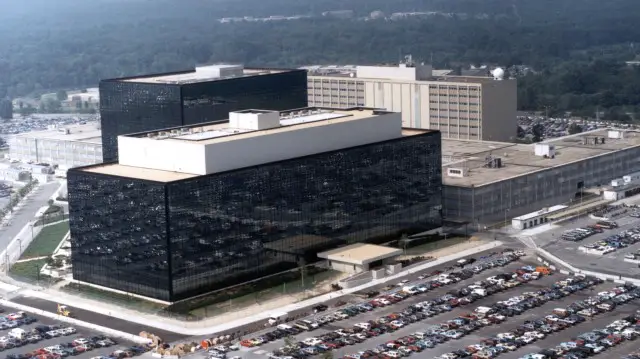
This may not seem like that big of a deal, but it is. The change allows the government to conduct surveillance for purposes other than gathering foreign intelligence, so long as the gathering of foreign intelligence is thrown in there. For example, the government could now say, “we’d like to conduct some warrantless wiretapping for the purposes of obtaining information on X, Y and Z, some of which pertains to foreign intelligence.”
Further, it gave the President the power to approve a warrantless surveillance provided the Attorney General had sworn to the following under seal of the FISA Court:
(A) the electronic surveillance is solely directed at–
(i) the acquisition of the contents of communications transmitted by means of communications used exclusively between or among foreign powers, as defined in section 1801(a)(1), (2), or (3) of this title; or
(ii) the acquisition of technical intelligence, other than the spoken communications of individuals, from property or premises under the open and exclusive control of a foreign power, as defined in section 1801(a)(1), (2), or (3) of this title;
(B) there is no substantial likelihood that the surveillance will acquire the contents of any communication to which a United States person is a party; and
(C) the proposed minimization procedures with respect to such surveillance meet the definition of minimization procedures under section 1801(h) of this title
50 U.S.C. § 1802.
In the alternative, the government can obtain a warrant from the court pursuant to probable cause that the target of the surveillance be a “foreign power” or an “agent of a foreign power”, and that the places at which surveillance is requested is used or will be used by that foreign power or its agent. In addition, the court must find that the proposed surveillance meet certain “minimization requirements” for information pertaining to U.S. persons. These “minimization” requirements are:
(1) specific procedures, which shall be adopted by the Attorney General, that are reasonably designed in light of the purpose and technique of the particular surveillance, to minimize the acquisition and retention, and prohibit the dissemination, of nonpublicly available information concerning unconsenting United States persons consistent with the need of the United States to obtain, produce, and disseminate foreign intelligence information;
(2) procedures that require that nonpublicly available information, which is not foreign intelligence information, as defined in subsection (e)(1) of this section, shall not be disseminated in a manner that identifies any United States person, without such person’s consent, unless such person’s identity is necessary to understand foreign intelligence information or assess its importance;
(3) notwithstanding paragraphs (1) and (2), procedures that allow for the retention and dissemination of information that is evidence of a crime which has been, is being, or is about to be committed and that is to be retained or disseminated for law enforcement purposes; and
(4) notwithstanding paragraphs (1), (2), and (3), with respect to any electronic surveillance approved pursuant to section 1802 (a) of this title, procedures that require that no contents of any communication to which a United States person is a party shall be disclosed, disseminated, or used for any purpose or retained for longer than 72 hours unless a court order under section 1805 of this title is obtained or unless the Attorney General determines that the information indicates a threat of death or serious bodily harm to any person.
50 U.S.C. § 1801(h).
So what does this mean in terms of the leaked FISA Court documents? It means it’s perfectly legal (and that’s not an opinion, it’s a legal fact)! Let’s look at what the FISA Court order stated and what the administration had to do to get it.
The order stated that the government could collect pen register data (numbers called, time and length of calls…) but could not collect the content of the communications, i.e. no eavesdropping on conversations. The order also complied with the minimization requirements laid out in FISA, so we know this affected US citizens. That’s it.
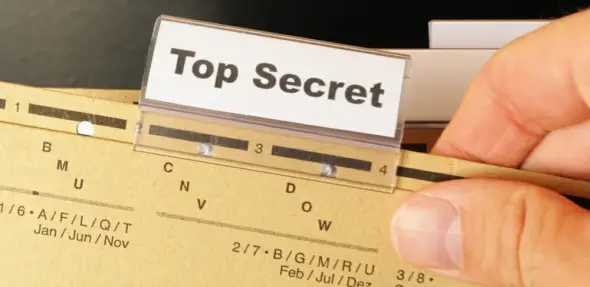
Now, what did the government have to do to get this order? Well, they could have conducted a warrantless wiretap so long as the Attorney General met the requirements of FISA outlined above, but the government chose to not go this route. They went to the courts, made a showing of probable cause and obtained a court order. The government did not have to do this under FISA, they actually went further to protect the privacy of citizens than they needed to under the law.
Those are the facts, not (and I can’t emphasize this enough) my opinion.
How I feel about it
Now, here’s is why I wanted to write this article. The government complied with (and arguably went beyond the minimum requirements of) the law. I’m not making a judgment as to whether this is morally or ethically right or wrong, merely, that they complied with the law. This situation is no different than Apple, Google, et al. taking advantage of the tax laws to avoid paying billions in US taxes.
Maybe it’s right, maybe it’s wrong, but the most important fact is: it’s legal. Don’t be mad at the government for taking advantage of a law that’s been in place for 35 years; be mad at the politicians who passed the legislation and who continue to approve FISA. We, as citizens, elect these people. If we don’t agree with the actions of the government, that are completely legal, we only have those we’ve elected (and ourselves, somewhat) to blame.
The issue here shouldn’t be “the government is engaging in illegal surveillance of its citizens.” The issue should instead be, “the government is engaging in legal surveillance of its citizens AND we need our elected officials to change the law so that this can’t happen in the future.” Let’s not forget, setting aside the FISA Court order, to collect pen register data (which is basically what the government did in this case), they did not need to meet the requirements under FISA. Under Supreme Court law, pen register data is not a “search” within the 4th Amendment and ideas like that might be the real problem.
This is an interesting conversation, so I pinged my colleague-in-action, Chris Michaels, regarding his thoughts on the matter. Note his full rebuttal in the section immediately following this one, and the questions he poses which I will try to answer.
The Devil’s Advocate, and his questions (Chris Michaels)
I’m a little fuzzy about what, exactly, constitutes a “search” under the 4th amendment now. In US v. Knotts, a bug was planted prior to the suspect taking custody of the item, and thus, it was not considered a search. Arguably, the LEAs were in the “right place, at the right time”, to observe (passive – anybody could have picked up the bucket), rather than conduct a search (active – targeting a specific person).
So while my electronics communications cannot be “searched” in the traditional sense, given the dynamic nature of internet routing (I give my communications to my ISP, who in turn gives them to their backbone provider, who in turn gives them to another backbone provider, who in turn… until they hit the provider of the target I’m communicating with), what in the 4th amendment protects me from having my communications diverted to a network that is monitored passively, without a warrant?
If I make an incriminating statement in the privacy of my own home, it can not be used against me if recorded with out my knowledge, but if I make an incriminating statement in front of a police officer who is just in the area and overhears, it’s legally admissible, is it not? What’s the difference?
If I were to post some important, sensitive documents on a bulletin board at the supermarket, and tell the target recipient to send somebody to pick them up – anybody who passes by that bulletin board can see what’s posted at any time, for any reason. This is a basic analogy to how internet networking works. It is not a private communication between two people, it’s equivalent to yelling from the top of a mountain to somebody listening on another mountain top. Anybody down below can see/hear what’s being said.

I’ve seen the government make this exact analogy before — and so long as encryption is not used to obfuscate the communication, I don’t have any expectation of privacy here — but a reasonable person with less understanding of technology might. The EFF has taken a look at a lot of cases involving things like this, and I liken this situation to the Washington case they have filed a brief in.
It states that police may read/intercept text messages because anybody can pick up anybody else’s phone if given the opportunity and leaf through it. While that’s a physical action, and mine is more electronic, the method is pretty much the same: anybody can leaf through my communications at any time if I leave them lying around. Or transmit them over the internet without encryption. For reference, see the EFF’s website.
What protections, if any, does FISA and the 4th amendment provide here, given the nature of the method of communication, and, does the Washington law conflict with that protection?
Lastly, I’m a firm believer that just because something is legal, it isn’t necessarily moral. Consequently, just because something is illegal doesn’t make it immoral, either. Congress has just approved a 5 year extension to FISA and the warrantless wiretapping laws it allows. What legal challenges can the average citizen put to the system, to help overturn this at the court level?
Obviously, voting for better elected representatives is one solution, but that won’t repair the harm that has already been done. Judicial review is important to power-check and balance the legislative branch, so what can we do to start that proper review of the situation, given that it currently appears legal, though in many people’s minds is immoral? I’ll kick it back over to Jay to help shed some light on all of this.
Antiquated laws, timeless solutions
I’m going to tackle Chris’ questions paragraph by paragraph, so let’s get started.
Let’s start with what “search” means. Search, in terms of the 4th Amendment, is a term of art, it is not the same thing as physically searching someone or something of that nature. When a court says it was “search” under the 4th Amendment, what they actually mean is that the 4th Amendment prohibits unlawful “search and seizure” and the behavior the police engaged in is a “search”, the type that would fall within the purview of the 4th Amendment. If a court were to determine something was not a “search” then it falls outside of the 4th Amendment and the action is not unconstitutional (from a 4th Amendment perspective).
In reality, nothing stops the government or anyone (though note that the Constitution, except for the 13th Amendment, only applies to state actors a/k/a governmental entities) from warrantlessly eavesdropping on communications. That’s the nature of humanity; we make laws, but people still break them. The only true repercussion is that if the government were to monitor these communications without a warrant and they are in fact a “search” within the 4th Amendment, then the evidence would get suppressed at trial (should the government bring a case against you) and it could not be used against you. In addition, you could potentially sue the agency for 42 U.S.C. § 1983 damages for violating your constitutional rights.
Unless it’s your spouse recording that conversation, it can absolutely be used against you whether you knew about it or not. Only one party needs to know a conversation is being recorded for it be legally admissible — just check out the False Friends Doctrine for more on that. No one, according to the Supreme Court, has a reasonable expectation of privacy in a conversation with another (unless it’s your spouse, attorney, doctor, etc…). So there’s absolutely no difference between that scenario and saying something in front of a police officer. If the conversation was being recorded without any participant’s knowledge within a space that one would otherwise have a reasonable expectation of privacy, then the police need a warrant.
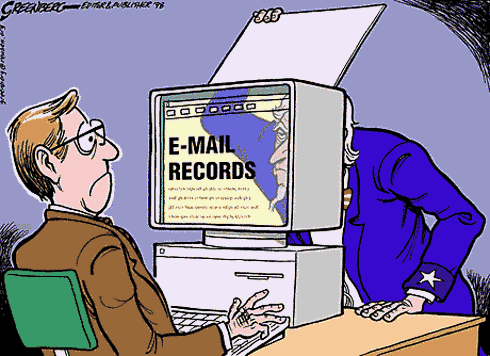
Here is the classic misconception that an individual’s reasonable expectation of privacy is “the reasonable expectation of privacy” against which all 4th Amendment search issues are judged. Because an individual has specific knowledge of the inner-workings of certain technology, does not mean the average person does not have a reasonable expectation of privacy. For a quick example, let’s use Gmail. It’s safe to assume we all use Gmail here, and we all know Google reads our Gmail because Google Now can pick up on the contents of our email and suggest things (and Eric Schmidt explicitly said so).
We still have a reasonable expectation of privacy in our email communications. Until the courts change the meaning of reasonable expectation of privacy to exclude email communications, we have that protection. As for the specific example of a bulletin board in a supermarket, there’s no reasonable expectation of privacy there, but I’d argue there are certainly a few more safeguards on the internet for sensitive data than that of a supermarket bulletin board.
The text message example is a simple judicial reality. Courts are always behind the times. The perfect example is the Stored Communications Act of 1986, which is still valid law. This act allows the government to get emails older than 180 days with a mere subpoena. The reasoning is because storage was at a premium back in 1986, and people didn’t leave email on servers indefinitely and anything over 180 was “abandoned”. The law has simply not caught up to the modern world. Courts are no different. The EFF is trying to get courts to recognize that text messages are the equivalent of emails and deserve the same protection from warrantless eavesdropping. Until an appellate court recognizes this or a legislature codifies this concept, it’s legal.
FISA doesn’t really provide protections beyond what was discussed above. The government has to meet certain criteria — if they meet it, then they can engage in eavesdropping. The only way the Washington law would conflict with anything is if it provided protections less than the constitutional minimum. Federal law sets the bar, and states can offer more protection, but not less.
If the federal courts in that circuit or the Supreme Court have stated that the police can’t intercept text messages without a warrant, then the Washington law is unconstitutional and it will get struck down in federal court. Because the EFF isn’t pursuing that route, I’m going to say the federal courts in that circuit haven’t addressed the issue and, therefore, there’s no conflict.
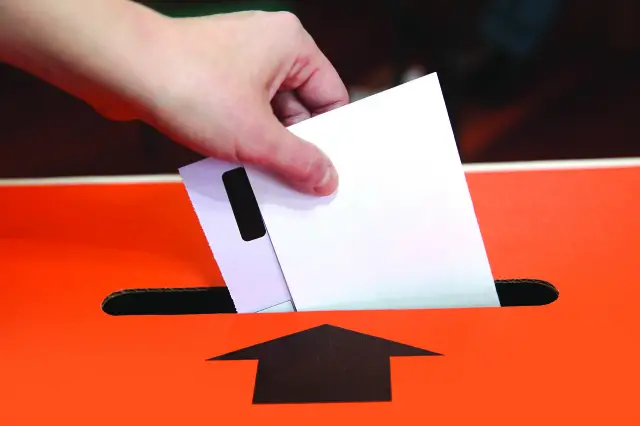
In terms of what the average person can do to help move these concepts into the 21st Century, they need only do what I’ve suggested: raise the issue with politicians. Unless someone is quite the benevolent person, engaging in a lawsuit (assuming they had standing to do so) of this nature would be prohibitively expensive and best left up to organizations like EFF.
Vote out the politicians that support the programs with which you do not agree. These laws didn’t suddenly appear in the United States Code, they were made by duly elected political officials. Write your congressional representatives and tell them you do not support these laws and you do not support a candidate who supports the laws. Laws made by courts can be undone by legislation. If you believe that pen registers should require a warrant, make a federal law stating just that — it just takes someone to stand up and actually do it.
What will you do about it?
If you’ve made it this far, thank you for reading and I commend you on your tenacity. In closing, I’d just like to say, regardless of your feelings about what we’ve discussed, educate yourself on the laws of this country. The resources are available. Then, take action. Let me repeat that: know and understand the laws before blindly stating unfounded opinions and assertions. Remember: someone, somewhere might just be observing. If you have questions or comments, let us hear them below. I’m always willing to help people understand the law!
If you would like to continue this discussion with me, feel free to follow me on Twitter @EDNYLaw, or circle me on Google+ at +Jay Klimek.

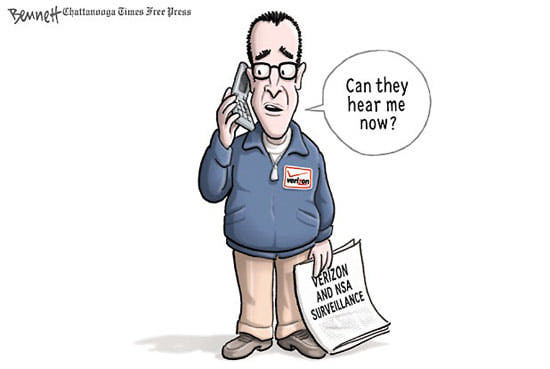
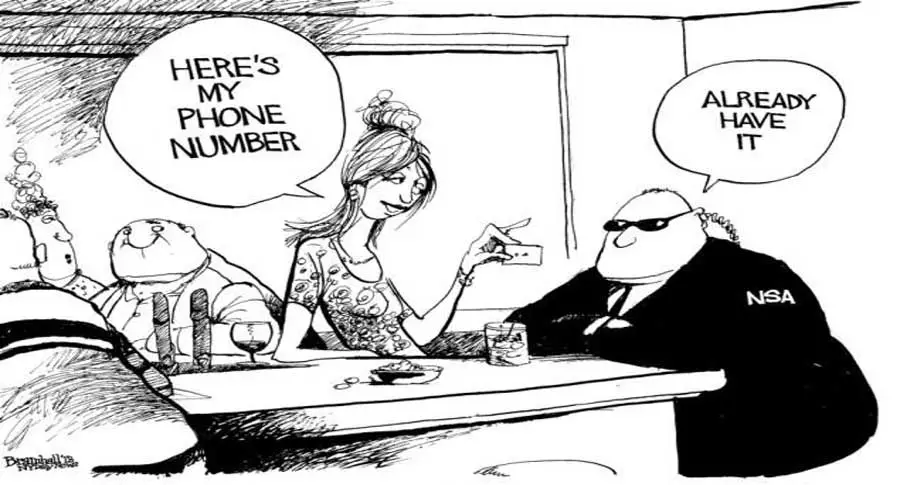









Everybody on 1,2,3 Class Action Lawsuit!
Class Action waste of time is more like it .
Good article, thanks for the explanations ai areas I am not well informed.
Thanks for reading and I’m glad you learned some things. That’s the entire reason I wrote the article. I just want people to understand the law.
Why is everyone getting all bent out of shape over this now? This was in the news as far back as 2006 when the NSA built a room inside a at&t building where at&t employees were not allowed in San Francisco doing exactly the same kinds of stuff. If people really cared about privacy where were they between 2006 and today (besides the ACLU who filed a lawsuit in 2008). Second, why is anyone remotely surprised by this. What did they think Homeland security was going to do? You would be a fool to think the govt wasn’t going to use homeland security as a way to circumvent privacy.
And does anyone here finds this all too suspicious? I mean really, the little pale face dude runs off to hide in….hong kong where he can really blend in? How much did china pay this dude off to cause this trouble and we are helping to perpetuate it.
That is exactly why I wrote this article. The fact that this is “news” is what should really be the news. This stuff has been legal, not since 2006, but for 35 years! Yet people are all up in arms now.
better late than never, I suppose. As long as they don’t forget next week.
And therein lies the rub… internet point to you sir
Because 90% of Americans are ignorant and get all their news from mainstream media and believe every thing theyre told. Whats sad is that these people think that protesting or complaining, or even more laughably VOTING is going to do anything. Voting does nothing except give people the illusion they have control, they dont. We gave that up a long time ago as well .
honestly, the reason its “news” now is because the tech savy and knowledgeable generation is just now becoming politically interested, we do expect privacy in our technology because for the first time its the only form of communication we rely on. it hasn’t been “in the news” for 35 years because we as the current “young voters” generation weren’t politically interested or even born 35 years ago and technology was not as important communicationaly to daily life as it is to us today. i am glad we are becoming politically and governmentally aware now though because it IS starting to affect us MORE and it needs to change.
Forget about 9/11 and Homeland Security. The govt has been actively spying on its citizens since the 50s. Anyone surprised or upset by this need to wake up and realize it was like this for a very long time. Americans like to think they have a vote or control over it but they dont. If only Americans wouldnt have been more worried about watching their soap operas and stuffing their faces then watching their govt take more and more and more away, especially after 2000 and more so after 9/11. I dont like it but I accept it because it was a reality from before i was born. If you have nothing to hide, then why worry. They dont care if youre pirating music and movies anyways….so who cares.
I’m not surprised by this, but that doesn’t mean I’m not upset by it. It’s still wrong (and an unnecessary waste to taxpayer dollars) even if it’s legal.
Everybody has something to hide. Does anybody and everybody have a right to know your medical history? Sexual history? Bank and investment balances? I’m sure you can think of plenty more examples.
Sure , but can we as civilians do anything to change it ? Nope, so why be upset by something we cant change?
Says who. We can demand congress scale back the Patriot Act. If they don’t, they won’t be reelected. I have no illusions that it’s all going to go away, but I think the issue has enough “heat” now that some changes will be made. I’ll be upset about this issue as long as there’s warrantless survallence of US citizens by the US gov’t. Just because something becomes “normal” or expected, doesn’t mean we have to like it.
TL;DR version? I don’t have time to read this right now.
If I could written a shorter article, I would have. It’s worth a read once you get the time. If you insist though tl;dr everything in the news about NSA, VZW and FISA Court leak is LEGAL, read the article to find out why
Thank you kind sir, I will I just wanted to know now even though I don’t have time to read it yet. I award you 2 internets for your kindness.
Wrong. Just because it’s law doesn’t mean it’s legal. Any law that violates the constitution is automatically void. The government gets away with with violating our constitutional rights all the time, but that doesn’t mean it’s legal.
Um… actually if it’s legal, then it’s legal. It’s kind of explicitly stated in the word “legal”. However, a law can be held unconstitutional. But, until the law is struck down, it is the law and it is legal. That’s the system we’ve agreed on and that’s how it works.
Whenever there’s a legal challenge to the constitutionality of a part of the Patriot Act the gov’t avoids it by either claiming the person(s) suing don’t have legal standing, or by withholding relavent information under the guise of “national security”. So the constitutionality never gets truely tested in court.
Further you have classified interpretations of what the Patriot Act means, which were validated by a secret court (FISA). Hence only the federal gov’t knows the true limits of what the Patriot Act allows.
Everyone can thank the PATRIOT ACT for making all this possible.
Patriot Act expanded the abilities of the government, but FISA existed 35 years ago and it gave the government a significant amount of power.
Thanks ! people think its a recent thing but i think its been going on since the 50s , the only time we find out about what it is , is when its public.
Yes but the Patriot Act enacted a lot more unjust into FISA. There’s so much more to the Patriot Act than people realize. It gives the government too much power. Our government is out of control with a lot of these laws and it amazes me that when someone brings to light this injustice they get thrown into some prison for some bogus charge. I understand that FISA may have been the start of it but the Patriot Act really brought it together.
well…. you clearly read the article….. ill sum it up for you in case you just missed something…. FISA started it, patriot act expanded one thing in it. its been around a LOT longer than patriot act
Thank you Patriot Act.
The only terrorism I’m guilty of is putting our nation’s intelligence officers to sleep as they track my life. :P
on the history channel, documentary about how the government is involved in your life, now back to the show, ‘the nsa officer was slowly lulled to sleep by the news about chimphappyhour getting his fresh bananas….”
Yeah, but they perk right up when I start flinging my poo. Pervs.
or masturbating to german torture porn !! lol
You obviously don’t work for the spooks….. otherwise you’d know I prefer Japanese torture porn. :P
LOL to each his own !
Doesn’t mean anyone else wants them tracking themselves nor does your passiveness give them the right to just do it. Just to be clear here.
Dude. It’s a joke. Chill.
Making sure you know that.
Life’s too short to be paranoid.
“paranoid”
If the quotes make you feel better, go with it.
R u mad?
Ha ha ha! No, why? Are you? Paranoid that maybe I might be? ;)
That has been an open secret. In my personal opinion I really don’t mind, I have nothing to hide, so, no worries.
what kind of garbage is that? Your apathy ruins this country. Ben Franklin said those who would give up liberty for security deserve neither.
Why is it “apathy” to accept a reality. The govt has been actively spying on its citizens since the 50s. Anyone that is surprised by this, or by that idiot Snowden needs to wake the F up, seriously. BTW Ben Frankin lived over 200 years ago. What Jon said is right, if you have nothing to hide then “no worries” My life is not that interesting to spy on, and neither is yours. Get over yourself.
You should read George Orwell’s 1984. It explains why your argument is flawed. Like you and JonANDROID, I don’t have anything to hide. Even though my life isn’t especially glamorous or spy-worthy, this issue is seriously important.
At the very least, the public needs to be aware of what is going on, educated on the laws and truly understand them. Then they can make an informed decision as to whether they agree with the laws. If the public agrees, great, then the government can keep spying on everyone to keep us “safe”. If, on the other hand, the public doesn’t like what’s going on, they can make laws and change laws to rectify the situation. The key though is transparency, let the public know what’s going on and let them come to a conclusion that is the best for the nation.
Agreed.
We dont make laws, we cant change laws, voting is an illusion. The only way to change things is to physically remove the govt, but no one will do that. Not till we realize we have no control at all over govt.
That’s bordering on conspiracy theory paranoia. We do make laws, in fact I’ve seen a few enacted in my time. We also make things illegal, like making the criminalization of abortions illegal. The people did that. How about making seat belts a requirement. Ralph Nader did that. I could go on. If you’ve lost that much faith in the system and find there’s no way back, then I suggest moving to a deserted island, because you’d have more luck there finding happiness than you would here.
Well, you call it what you will, its true. Do i want to move to a deserted island ? no. But i wont take part in something i dont have an effect over. “WE” dont do anything, the govt does it, if its in their interest, and as long as it pacifies the populace into the illusion they did it. Lets say millions of citizens got together and wanted the govt to stop spying, the govt would just tell them what they wanted to hear “we will never do it again”. Then the millions of ignorant, dumb people will believe they made a difference because its “their” country. Meanwhile the govt will continue what theyre doing, having pacified the interest in spying by saying they listened to their constituents. BS. You seemed to take the same opinion as me that the govt has been spying on its people for at least 30yrs but you believe that if WE suddenly decided we didnt like it and voted that they would stop ? If you believe that then you are seriously contradicting yourself. Its done, there is no going back. George Carlin RIP said it best “It’s a big club, and you aint in it”
It is important, but if the govt wants to listen to my calls to my wife or watch me watching porn, more power to them.. 1984 was a great book and ahead of its time, but the citizens of this country were ignorant and its basically too late, much too late to change anything. The argument is not flawed, the majority of Americans these days, especially young ones think their lives are super special and complain about privacy when they themselves put all their info out there on public networks for anyone to see, then they get upset that people are looking at that ? its ludicrous. My point again , is that its too late. Even if people are educated about it, what are we gonna do ? vote ?? dont make me laugh
Exactly, that is the point. It’s not that your life needs to be special or glamorous, it is already special, it is yours and no one else’s. We are all entitled to privacy, regardless of who we are. Also, being British I fail to understand why I should be spied on by another country.
Thank you! Enough said.
you are an idiot. get over yourself and please KILL yourself. fucking idiot.
Just because it’s been going on for a long time doesn’t make it okay.
One more argument for everybody to become a furry with a fetish for midget porn, making the NSA’s job even less enjoyable.
I’m all for a person’s right to privacy, but if you have nothing to hide then why even worry about it. We put so much out there on social networks for all to see, why try hiding it at all.
So if the government has nothing to hide, then they should declassify all of the top secret documents correct? Not gonna happen. We the people have a reasonable expectation of privacy. It is not about having anything to hide.
Good point. The people are supposed to being watching the government, not the other way around.
Usually the reasoning is that the government could suppress opinions or counteract any group that contradicts the existing groups in power. It could even dissuade people from getting together to discuss government reform in any electronic means. It could also extend to discourage leaks of information to the press or discussion of any major negative point about government actions in the press. Essentially it threatens to undermine freedom of speech, freedom of press, rights of assembly, and rights against illegal search and seizure.
As for criminal punishment, yeah any good law abiding citizen shouldn’t have to worry about criminal punishments, but that’s only part of it.
As far as my opinion, yeah I don’t care if they know who I’m contacting as long as it can’t be used against me. I know that I can be fired in 29 states simply for being gay, so we are not yet to a point where I can be confident that I am protected by the laws of this nation. I have done nothing wrong and broken no law, but I can still be punished for my private life.
You do have something to hide, even if you don’t realize it. Gay marriage was illegal everywhere 20 years ago – it changed, because people wanted to change that law, because they felt strongly about their relationships. However, sodomy laws were also passed in the majority of the US, basically making gay relationships illegal. So how could a gay marriage bill get such overwhelming support if being in a gay relationship was illegal to begin with?
Also do you think that the legalization of pot in Washington and Colorado would ever have happened if a significant number of the population wasn’t already engaging in its use? I assure you, they didn’t pass because a significant number of the population wanted to *try* it.
There are things I’m sure you believe in that are not 100% legal. Even the Federal Government can’t tell you what is and isn’t illegal, what with all the various codes and laws in various legal contexts, statutes, and included references. See http://online.wsj.com/article/SB10001424052702304319804576389601079728920.html for details. So when even the lawmakers can’t tell you what is and isn’t illegal, you have a lot more to hide than you may realize, and the only thing keeping you safe is that nobody has chosen to go after you.
I cringe every time I hear that argument, and I’ll explain why.
1.
Yes we put so much on social networks, but we do in fact choose
ourselves what we put on those networks. We are not choosing to post
this information into a government database.
2. While you may not
have anything to worry about now, things that are legal today are not
necessarily legal tomorrow, on top of that I’m sure most Americans are
not knowledgeable to every single law out there. As far as the courts
see it, ignorance of the law doesn’t give you a pass. you probably
break at least 1 law a week without even knowing about it.
3.
This information on people is not being sifted through by people that
can take this information in context. It is most likely being sifted
and sorted through some type of software looking for specific data
points when then flags it. This software is not infallible because of
the fact that it is written by people like me (and I know my software
has bugs, i try to keep them to a minimum through proper testing
procedures but from time to time something leaks through). Would you
feel comfortable knowing that you could be flagged for a terrorism
investigation because of a glitch in a software program? Before you use
the “if i have nothing to hide” argument on that one, let me say this.
Considering an investigation means that people in your life (family,
friends, bosses, coworkers, etc) the way they interact with you could
very well be changed forever because the FBI came questioning about
you. Which then changes the way you behave, you may no longer say
certain things out of fear of triggering another investigation (which is
why we have freedom of speech in the first place).
4. This one
kind of goes along with #3, but false positives do happen. The flagging
algorithms are similar to the way credit card companies detect
fraudulent charges on your card and block purchases when they think some
unauthorized person is using it. I can tell you in the past year
alone, my credit card company has blocked purchases due to false
positives 4 times, yes 4 times. 1 of those times also happened to leave
me stuck without gas in the middle of nowhere in Nebraska because i was
taking a vacation from Colorado to Iowa to visit family. This false
positive left me sitting on the phone for 2 hours in the blazing heat of
Nebraska summer while i tried to convince them that it was me using my
card. Now imagine if that was the government anti terrorist
investigators making that false positive?
5. Government employees
are not all 100% trustworthy and access to top secret info is pretty
easy. The fact that this one guy was able to leak these kind of
documents and information just proves that point. Luckily though, he
did not decide to use your information with ill intentions (identity
theft, fraud, simply targeting you cause he doesn’t like you). We already have IRS employees that misused personal information to harass people because they had different political views, so there is obviously a problem there.
Are you able to trust with 100% certainty that there isn’t just ONE
person that won’t do something bad with your information? it only takes
one, and the number of people that have access to this information sure
brings my trust level down to about ZERO.
I’m going to completely agree with you. Your reasoning is just the type of reason I like to see. Whether one agrees with it or not, it’s thoughtful, logical and uses facts.
And to briefly expand on one of your points. If the government hits on a false positive and investigates you, and finds something ACTUALLY illegal, guess what’s admissible in court. You hit the nail on the head, ignorance of the law isn’t a defense. It could be as simple as torrenting a few movies, or smoking a joint with a friend… whatever it is, if it’s illegal and they find it in the course of a lawful search, it can be held against you (and even if it’s not lawful, there’s enough admissibility exceptions that it’ll probably come in anyway)
Hope you never consent to a search on a vehicle you bought used then something like this happens…
Officer pulls you over: “I noticed you were speeding back there on the interstate. You know, we’ve had alot of drug smuggling going down on this stretch of road. Is it all right if I search your car?”
You: “Sure, I have nothing to hide.”
Officer looks around: “Well, well, well. Looks like we have a pound of pot stashed under the dash. Care to explain that?”
You: “it isn’t mine”
Officer: “Put your hands behind your back”
The moral of the story: Maybe you do, maybe you don’t have something to hide. Still, it is in your best interest to keep your business YOUR business.
The “if you’re not doing anything wrong you’ve got nothing to hide” argument is bogus. If you truly have “nothing to hide”, please give us your bank balances, full medical history, a list of everyone you’ve called or been called by in the last year, etc. And let us track your cellphone location while you’re at. Don’t want to give us all that? What are you hiding?
jmiller808 also made excellent arguments why you are wrong.
As to your social network comment, I don’t post anything to social networks and only have a G+ account to rate Android apps. Why does the gov’t need to know who I ordered pizza from last week, how often I call my parents, or how long I was on the phone with my boss? It’s irrelavent to the “War on Terrorism”, an unnecessary waste of taxpayer dollars, and none of their damn business.
I think this has become more of an issue lately not because of privacy, but because of a lack of trust in our government. The legality of all of this is a mute point and stupid. If the public is not okay with the government doing something the government should stop doing it. Aren’t they supposed to listen to their citizens? Is this not a government “For the People, By the People”? I am just totally blown away by the fact the any government official thinks it is okay for the government to do something that its population doesn’t like. This is supposed to be a free country. They are supposed to do what we say. Not the other way around.
Wow, wow. “If the public is not okay with the government doing something the government should stop doing it. Aren’t they supposed to listen to their citizens? Is this not a government “For the People, By the People”? Are you kidding ? How old are you and what flag covered rock have you been living under? The govt dont care because they know we cant effect them, with elections, with protests, nothing. Especially because the majority of people in this country are like you, blindly believing that the citizens control the govt, by of all things voting, or not “liking” it. The united states is like any other country out there, siphoning of basic rights, censorship in the media, corrupt govt lying to its populace. If you dont think so then youre ignorant and should go back under that rock and pretend you dont hear or see whats going on. The only way things will change is if the people rise up and do something about it, but they wont, they got to watch the season premiere of Dancing with the Stars or American Idol or have to know what the Kardashians are doing.
“We, as citizens, elect these people” Biggest joke ever, anyone that still believes that was asleep during the 2000 election. Ever since then none of the elections have been decided by us. They took the electoral process out of our hands and watched to see if anyone noticed, and no one did, why stop there ? Ever since i heard someone on CNN say that even if a candidate wins a state, the electoral voters dont have to go with the candidate that won the state and can pick whoever they like, i was disenfranchised with the whole voting process. As for spying on American citizens, the govt has been doing that since the 50s. Worse is the testing of radiation on American citizens in the midwest. But the govt has proven that the well being and privacy of its citizens is not a major concern.
It’s been that way longer than 2000. Both the parties are puppets, it doesn’t matter which one wins they’re both crooked.
Precisely, and theyre working together to screw us over. Everything is planned. Im sure they already know who will be president in 2016.
Please research our election system before making such broad statements. What you are talking about is called “faithless electors”. That’s what happens when an electoral college vote goes against the will or law of the people of that state. That did not happen with Bush. He was elected through a flaw in the system. Laws regarding elected officials vary by state, but the electoral college is specific to the presidency and yes it has been legal since the formation of that system over a century ago for a president to be elected without popular vote by a flaw of the electoral system. The electoral college uses senate and congress seats to calculate votes ,so small states have a disproportionate weight and even then only two states divide votes proportionally in the way that their people voted, so when a democrat wins California they get All the votes as if every Californian voted for them and a republican will get all of the votes from Texas even though 60% of the people of that state have voted for him. It actually makes a single vote in Wyoming worth as much as 79 votes in California. It’s unfair and outdated, but will not change until a real faithless elector happens and swings a presidency. The election of senators and congressmen do not use this system. Every state is divided into congressional districts and a popular vote is held to fill the seat, so it’s a more “traditional” election in that popular vote determines each seat. A process called Gerrymandering is often used to almost rig seats by either clumping or distributing votes of one type. (Example: 5 imaginary areas exist, 1 votes mostly for party X, 4 vote for party Y. With Gerrymandering you can make four districts that split up the votes of party X and rig it so party Y has the advantage or it could be rigged to make sure that 1 seat is always biased towards party X and 3 consistently go to party Y) Some states, like California, removed districting from the power of the legislature and stuck it in the hands of the courts in an attempt to make it more “fair” with less politic driving the lines. Gerrymandering affects congressional and local seats, but not the presidency because no state has electoral college votes based on individual districts. The two states that do proportional voting do so by looking at overall polar voting numbers state wide and then assigning votes.
Maybe you should do research. George Bush was not “elected” he was “awarded” the presidency by the Supreme Court, rendering the voting of the American people moot. Besides, Gore won the popular vote, but lost the presidency because of electoral votes. Does that make any sense ? If the people voted Gore to be president and the electorals decide Bush, how do our votes count ? They dont ! But in 2000 the election was removed from any of that when the Supreme Court gave the presidency to Bush and came up with a lame excuse placating the idiots that populate this country and since then its been completely out of our hands. People are more worried about the Idol results or who the next cast of Dancing with the Stars will be to even be concerned .
Bush was elected by the Electoral College (which has been how we elect presidents since we created our constitution) and the Supreme Court confirmed that he did win legally (sad, but true by our own screwed up system). He did not win the popular vote, but that isn’t required (and yes that is screwed up, but it was part of the system long before Bush ran)
I’ll go a little deeper into why the congressional branch is flawed and how that affects the presidential election.
We have two houses (bicameral legislature). One is based on population with a minimum of one representative and on is 2 votes per state (senate). Because of the minimum it means that small states (like Wyoming) get a minimum of one congressman when they are frankly smaller than even a single chunk of suburb around a major city in another state. It means that their votes count for more in congress because they get disproportionate representation. In the senate everything is supposed to be equal at 2 per state. This is how the electoral college is calculated. Every state gets a minimum of 3 votes (2 senate, 1 congress) and more if they have more congressman (2 senate, 53 congress for California) Really if we set wyoming as the low bar at (575K people per congressmen) then California should have a full 66 congressmen in the house of Representatives, but we stopped adding reps after we reached 435 in 1911 because congress was getting too big to function. We now just reapportion the representatives out of the 435.
Now on to the screwed up system we use to see who gets electoral college votes. You’d think that if Obama got 53% of the vote and Romney got 45% of the vote in California, then the 55 electoral college votes would be split like the people’s votes were, but they aren’t. Obama got every single one of the 55 votes. This is how Bush won without winning. The republican party is famous for doing well in southern and midwestern states that are quite rural. Their rural nature makes them over represented in the legislature and thereby over represented in the electoral college. He won enough small states that it gave him enough Electoral College votes to win while the populous states with high populations went to the democratic party and are underrepresented, so the popular vote and the electoral college were mismatched without being illegal. It’s a perfect storm of idiotic BS from a system created over 220 years ago and used ever since.
You want to know the worst part?!!! Bush wasn’t the first to win that way!!!! (which btw absolutely infuriated my politics classes.)
– John Quincy Adams lost by 44K votes, but won by electoral votes.
– Rutherford B Hayes lost by 264K votes, but won by electoral votes.
– Benjamin Harrison lost by 95K votes, but won by electoral votes.
– George W Bush lost by a whopping 543K votes, but distributed across the right states, so he won by electoral votes
The electoral college has managed to get us FOUR presidents that should not have held the Presidency. It’s the 21st century. We should be using popular vote, but congress and the states won’t dare touch it. It will screw us again in the future.
Also, If you want your vote to count, then move to Wyoming. A vote in Wyoming for the presidency counts for significantly more than a vote from California. Want a scary fact?! California has 38 Million people. The smallest 19 states combined have 39 Million people. California has 55 Electoral votes. The smallest 19 states have a combined 80 Electoral votes despite having a combined total population that is about the same size as California. The smaller states get a much bigger say in who leads this country. It’s a flaw in the system that representatives of those small states will fight to keep. Oh, and yes the Electoral College system was established at the constitutional convention. That’s the same one that produced the constitution and bill of rights that we use today.
Elections are decided by the ones who give out the most free goodies to the most people so that they can be quiet when the rest of their rights are taken away.
Panem et Circenses
If Congress passed the law, then of course it’s legal. I don’t think it’s Constitutional, however, but how do we balance the Constitutional rights of citizens against the threat to their lives by Islamic terrorists? The answer clearly is to limit, and focus, surveillance to radical Muslims. And this should be the approach by all Western countries.
I hope you neglected to put a “/s” after that. If not, your idea of balancing constitutional rights is a little off.
Why do you think so?
Because it is unconstitutional to discriminate based on age/race/national origin. So you’re saying that we need to subvert an entire race’s constitutional rights based on a fraction of them displaying a certain characteristic? That’s not with this nation is founded upon. I hate to use this quote because I think it’s often misused and somewhat antiquated but: Those who would give up Essential Liberty to purchase a little Temporary Safety, deserve neither Liberty nor Safety. – Ben Franklin
Ben Franklin would have a very different view today given America’s ethnic makeup and the threat from radical Islamists here and abroad.
Im glad you let the govt decide who the bad guys are for you. Theyre happy with your patriotism.
So you wouldn’t classify radical Islamic terrorists as bad guys?
But the flaw in your argument is that not all Islamics are terrorists. Shall we assume all Italians are in the mafia, all Russians are in the KGB, all Japanese are bad ass ninjas (ok that was a little stretch)? But you get the point right? Just because a small fraction display a characteristic, you’re willing to take away the entire groups rights away? I think we did that before, it was called internment camps. The Nazis did that too…
You are distorting my position. I very clearly stated that surveillance should be limited to and focused on *radical* Muslims. Therefore you focus on chatter involving Jihad, etc. Was the government targeting all Germans when they spied on Nazis? Or all Italians when they surveilled the Mafia?
That’s what the government does now. They get a warrant when they have probable cause. You don’t have to identify a group of people by their race/religion/national origin. You can merely say, the government should surveil people whom they’ve identified as engaging in dangerous behaviors, doesn’t have to be just muslims. Look at Timothy McVeigh, under your standard, he’d be free and clear. I say, let’s go with probable cause and catch whomever gets caught.
Then we really have no difference of opinion, for the most part. But do you agree that it would be most efficient and effective to focus on the chatter amongst the Muslim community to uncover that probable cause? Is it more effective to monitor Islamic websites and communications than, say, Weight Watchers forums?
Absolutely not. Focus on what is known. Remember, innocent until proven guilty. Not the other way around.
What is known is that radical Muslims preach jihad and foster terrorism, so we focus on them. We also know they are trained, funded and receive instructions from abroad so it’s a matter of national security. Innocence or guilt does not factor into this as this is not about administering justice, but policing and catching terrorists – and most importantly, *preventing* attacks before the plots can be executed.
Not because a news broadcast told me they are. Im assuming that because im guessing you dont know any personally and are going on the opinion and the direction of a mainstream media source. So its basically an “opinion” or worse “hearsay”
So the two guys who killed and maimed during the Boston marathon … bad guys or not?
I don’t like how Jay makes it look like just cause it’s legal, it’s OK. These politicians made these laws themselves, it’s not like WE THE PEOPLE erected these laws. They used specific wording, in order to take advantage of the text at a future date. This is unconstitutional, I don’t care if you disagree, but the Patriot Act is unconstitutional.
I think you missed the point of my article. I never said it was ok, I merely said IT WAS LEGAL. My point was, don’t blame the government for taking advantage of the laws in place, blame the politicians who made the laws.
I think, objectively, the Patriot Act is likely unconstitutional in a traditional sense. But, it’s just an expansion of FISA which has been law since 1978, so getting it declared unconstitutional would be tough. Plus, as pointed out in the article, what they did in this specific example is legal under Supreme Court law, meaning they didn’t need federal legislation to do what they did.
I could Google this but since you’re here … did the government spy on Nazis in the country before and during WWII?
Probably, though I don’t know off hand. I know there were underground organizations in Europe. In fact my Grandfather was in the 101st Airborne. When he was paragliding in, they miscalculated and ended up behind German lines. The Dutch Underground dressed them up as Dutch citizens and gave them bicycles and rode them right through the German lines.
I’m sure there was all sorts of covert things going on. Obviously not to the extent they are now. But a 1940’s version, I’d think. Actually, I believe they used the Navajo language to encrypt communications because it was the one thing the Germans couldn’t break. I think there was a movie about that “Wind Talkers” or something. So, clearly everyone was spying on everyone.
Ok, I understand that part. But still saying that it’s “legal” is an oxymoron, because THEY are the ones that wrote the law! It’s the same thing if I wrote my own little law granting me an exemption from speed limits; and then when getting pulled over by a cop, I whip out that self written law, and say: Look, it’s legal, I made it legal on this piece of paper, so i’m good. You see my point? We the people did not get a choice when the Patriot Act was written. We had no say in it.
Yes, except your law wouldn’t carry the FORCE of law. They are the government, they determine what is legal and illegal. If they say something is legal, it’s legal until there’s enough pressure to change it. Take gay marriage, it’s perfectly legal to discriminate against gay people at the federal level. Why? Because it’s not illegal. If it becomes illegal, it’s because the politicians have heard the voice of the people (and this issue I will say people, in other issues like taxes is usually more corporations… but I digress) and change the law.
Someone’s got to make the laws, and in a civilized society, that’s a democratically elected government. They make the laws, therefore their laws are legal until proven illegal, or changed to be illegal. It’s the system that the entire democratic world uses. We’re stuck with it, so we might as well try to change it for the better.
I hear you. But what really captured my attention, is when Loretta Sanchez said this after a closed door NSA briefing yesterday:
—-“I think it’s just broader than most people even realize,”
—–“I believe it’s just the tip of the iceberg,”
——-“What we learned in there, is significantly more than what is out in the media today.”
She has confirmed with these statements, that NSA is overstepping the law. I understand your point of view, but clearly there is no oversight within the NSA, and that is why Snowden leaked the files. He is an American Patriot in my eyes.
I’m not saying he’s not. This article is based on FACT not speculation. If there’s more going on, show me the papers and I’ll tell you whether it’s legal or illegal. Until then, it’s speculation. But I’m all for more transparency.
If the government is going beyond what we saw here (and in all likelihood they are) then we need to measure it against legislation and Supreme Court precedent and determine if the government has overstepped the law.
Until there’s transparency, everything is speculation. My point in writing this though was to address all the people saying “this is illegal, it’s unconstitutional…” To put it simply, no it’s not. At least, so far as any FACTS are concerned.
Yes, we are in uncharted territory right now, who knows how this will end. Personally, I have lost hope for Americans. Americans are either too lazy to protest, or don’t want to walk away from jobs and mortgages. Most likely this will fade away the way -Occupy- did. Sad.
I hate to say it, but I kind of agree with you there. Again, that’s why I wrote this article. Most people are too lazy to take the time to educate themselves. I mean, everything I used to write this article is publicly available but no one will take the time to put something together. Hell, I bet the fact that this article was north of 3800 words deterred some people from reading it at all.
People are far to content to get their “news” from talking heads on the TV or people on the internet with no credibility who don’t fact check and put a spin on it. The truth is there, they just don’t want to find it, they’d rather be spoon fed lies.
TV Bobbleheads are more entertaining than reading ;)
Check this out, summaries it all a lot clearer https://www.eff.org/nsa-spying/timeline
Patriot Act was pushed through without the people who granting it okay even reading and understanding it until after the fact.
I do enjoy being quoted ;)
When it comes to your privacy . The government is nothing to worry about if you’re not doing anything wrong.. There are other mentally ill people to worry about in this digital era..
“If I make an incriminating statement in the privacy of my own home, it
can not be used against me if recorded with out my knowledge.” But now with the media hype, such as your article, it has lifted the veal of secrecy and now almost all households know they are being monitored, so now it is expected, right? We now no longer have the expectation of privacy, which is wrong.
I’m sure the terrorists are amused by people arguing against surveillance, while plotting to kill them.
TLDR; This timeline paints a much better picture about how our government pushed for, and made many people resign over their questionable desires https://www.eff.org/nsa-spying/timeline
So encrypt all my conversations from now on? Got it.
My brain…is mush…. after reading this…. Too smart of an article for me :P
We all are under his watch…
Beware!! Big brother is watching